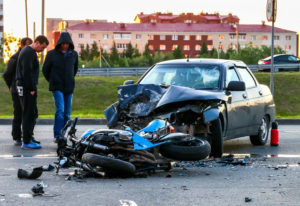Riding a motorcycle is an experience like no other. It’s wind, freedom, and a connection to the road that car drivers just don’t get. However, that freedom comes with a chilling reality. Motorcyclists are staring down a sobering statistic: you’re about 22 times more likely to be killed in a crash than someone snug in their four-wheeled cage.
What makes it even more infuriating? When an accident does happen, the default assumption, the lazy narrative, often unfairly points the finger straight at you, the biker. As if choosing two wheels automatically makes you the reckless one.
If you’ve been in a motorcycle accident and are now facing the frustrating tide of undeserved blame, the team of Cape Girardeau motorcycle accident attorneys at Cook, Barkett, Ponder & Wolz is here to help you fight back and set the record straight. Give us a call at (573) 335-6651.
Why Everyone’s Quick to Point Fingers
It’s almost a reflex action for some folks. A motorcycle goes down, and instantly, the image of a leather-clad daredevil pops into their heads. This “reckless rider” myth is tired, old, and frankly, insulting to the vast majority of riders who are conscientious and careful.
This bias seeps into how accidents are perceived by witnesses, sometimes even by initial responding officers, and definitely by those who stand to lose money by paying out claims. It’s a preconceived notion that you, as a motorcyclist, have to fight from the get-go.
“Sorry, Didn’t See You!” – The Lamest Excuse in the Book
This one has to be the chart-topper of driver excuses. “I just didn’t see the motorcycle.” It’s said almost as if motorcycles are inherently invisible or pop out of thin air. This is plainly an admission of negligence, not a valid excuse. Drivers have a fundamental, legal duty to be aware of all vehicles sharing the road, regardless of their size.
Saying “I didn’t see you” translates to “I wasn’t paying enough attention,” “I didn’t look properly,” or “I was distracted.” Motorcycles, while having a smaller profile than a semi-truck, are hardly stealthy. They have headlights, often wear reflective gear, and make noise. The failure isn’t with the motorcycle’s visibility; it’s with the driver’s observation skills, or lack thereof.
How Insurance Adjusters Play the Game
Insurance companies are businesses. Their goal is to minimize payouts. It’s not personal; it’s financial. And the “reckless biker” stereotype? That’s gold for an adjuster looking to devalue or deny your claim. They might subtly (or not so subtly) imply that your choice to ride a motorcycle inherently means you accept a higher risk, or that you must have been doing something wrong.
Adjusters are trained negotiators. They might try to use your statements against you, look for any tiny inconsistency to cast doubt on your version of events, or pressure you into a quick, lowball settlement before you fully understand the extent of your injuries and losses. They capitalize on the bias, hoping you’ll just accept a smaller share of responsibility, or less compensation than you deserve. They count on you not knowing your rights, or not having someone in your corner who does.
What the Statistics Really Say About Motorcycle Accident Causes
When you peel back the layers of assumption and look at actual data and common accident patterns, a very different picture emerges.
- Left-Turn Catastrophes: This scenario is tragically common and overwhelmingly the fault of the car driver. The car attempts a left turn in front of an oncoming motorcycle, either misjudging the bike’s speed and distance or simply not seeing it at all. This directly violates the motorcyclist’s right-of-way. The physics are brutal; the motorcyclist has little to no time to react, and the impact is often devastating.
- Lane Change Ignorance: How many times have you seen a car drift or swerve into another lane without a signal, or without a proper head check? When that other lane is occupied by a motorcycle, the consequences can be severe. “I didn’t see them” is, again, not an excuse for failing to ensure a lane is clear before entering it. This is pure and simple driver inattention.
- Distracted Driving Epidemic: Smartphones, complex infotainment systems, eating, a crying child in the back – the list of distractions for drivers is endless. Every second a driver’s eyes are off the road or their mind is not on driving, they are a hazard. For motorcyclists, who require other road users to be vigilant due to their smaller profile, a distracted driver is an active threat. Texting and driving, for instance, impairs a driver more than being at the legal alcohol limit.
- Impaired Drivers: While there’s rightly attention on impaired motorcyclists, let’s not forget that impaired car drivers are also a significant danger. Someone operating a two-ton vehicle under the influence of alcohol or drugs poses an immense risk to everyone, especially to more vulnerable road users like motorcyclists. Their impaired judgment, slowed reaction times, and reduced coordination can easily lead to them causing a collision.
Understanding “Fault” When the Stakes Are This High
At its core, accident liability comes down to a legal concept called negligence. Think of it like this: everyone using the road, whether they’re on two wheels or eighteen, has a “duty of care” to operate their vehicle in a way that doesn’t needlessly endanger others. This means paying attention, following traffic laws, and generally acting like a reasonable person would under the circumstances.
When someone breaches that duty – for example, a car driver who runs a red light because they’re texting, or fails to yield the right-of-way – and that breach directly causes an accident that results in harm (like your injuries and your wrecked motorcycle), that’s negligence. Negligence concerns carelessness that leads to damage, rather than malicious intent. Proving this breach of duty and the resulting harm is what our team works to establish.
Comparative Fault: It’s Not Always All or Nothing
Sometimes, more than one person’s actions contribute to a crash. This is where the principle of “comparative fault” comes into play. Many states, including Missouri, use a “pure” comparative fault system. This is actually good news for injured parties.
- General Principle: Under pure comparative fault, even if you are found partially to blame for an accident, you can still recover damages from the other at-fault party. Your total compensation will simply be reduced by your percentage of fault. For example, if you suffered $100,000 in damages, but a jury finds you were 10% at fault and the other driver was 90% at fault, you could still recover $90,000. This is far better than states where being even 1% at fault can bar you from any recovery.
- The Insurance Company Twist: You can bet your last dollar that the other driver’s insurance adjuster will try to exploit comparative fault. Their job is to pay out as little as possible. So, they will scrutinize your every action, looking for any tiny thing they can label as fault on your part to drive up your percentage and drive down their payout.
What to Do When You’re Thrown From Your Bike and Into a Blame Game
The moments, days, and weeks after a motorcycle accident can be a blur of pain, confusion, and mounting stress. You’re dealing with injuries, probably a damaged or totaled bike, and then the phone starts ringing with calls from insurance adjusters.
It’s a lot. But the actions you take (or don’t take) can have a significant impact on your ability to recover fair compensation and push back against any undeserved blame.
Get Medical Care Without Delay
This cannot be stressed enough. Adrenaline is a powerful painkiller. You might feel shaken but “okay” at the scene, only to discover serious injuries hours or even days later. Go to the emergency room or see your doctor as soon as possible after the accident, even if you think your injuries are minor.
Getting prompt medical attention does two things: First, and most importantly, it ensures you receive the care you need for your health and recovery. Second, it creates a medical record that documents your injuries and links them to the accident. Delays in seeking treatment can be used by insurance companies to argue that your injuries weren’t serious or weren’t caused by the accident.
Notify Your Insurance (Carefully)
You typically have a contractual obligation to notify your own insurance company about the accident, even if the other driver was clearly at fault. When you do, stick to the basic facts: who, what, when, where. Do not volunteer opinions about fault (yours or the other driver’s).
Be cautious about giving a recorded statement to any insurance adjuster – even your own – without first speaking to an attorney. Adjusters are trained to ask questions in ways that might elicit responses they can use to minimize your claim. You have the right to have legal counsel present or to consult with a lawyer before providing such a statement.
The Non-Negotiable: Talk to a Lawyer Who Gets It
This is where things can take a sharp turn in your favor. Before you get too deep into discussions with insurance companies, before you accept any settlement offers, and especially if you’re getting even a whiff of being unfairly blamed, you need to talk to a lawyer. Not just any lawyer, but one who understands motorcycle accidents and isn’t afraid to challenge the biases against riders.
Motorcycle Accident FAQ
Q: Do I have to wear a helmet in Missouri, and does it affect my claim if I wasn’t?
A: Yes, Missouri law requires riders under 26 to wear helmets unless they meet specific insurance requirements. However, not wearing a helmet does not automatically bar you from recovering compensation. It may affect the amount of compensation you receive only if your injuries would have clearly been less severe had you been wearing one.
Q: What if the driver fled the scene – can I still recover damages?
A: If you’re the victim of a hit-and-run, you may still be able to recover compensation through your own uninsured motorist (UM) coverage. Missouri requires UM coverage, so you likely have it unless you opted out in writing. It can cover injuries even when the at-fault driver disappears.
Q: Can I still file a claim if I wasn’t wearing protective gear (jacket, gloves, etc.)?
A: Yes. Failing to wear full protective gear might be used by insurers to argue you contributed to the extent of your injuries, but it doesn’t eliminate your right to compensation. They’d need strong evidence that your injuries were specifically worsened by the missing gear.
Q: What if the crash happened due to a road hazard like a pothole or loose gravel?
A: You may have a claim against the government agency responsible for road maintenance or a construction company if negligence can be proven. These cases are harder and often involve strict notice deadlines.
Q: My passenger was injured—can they file a claim too?
A: Yes. Your passenger can usually file a claim against the at-fault driver (or drivers), and possibly against your insurance as well, depending on the coverage and fault determination. Their rights are separate from yours.
Q: How long do I have to file a motorcycle accident lawsuit in Missouri?
A: You generally have five years from the date of the accident to file a personal injury lawsuit in Missouri. However, if a government entity is involved or someone dies as a result of the crash, different deadlines might apply. Don’t wait—evidence gets stale and deadlines creep up fast.
Let’s Get You Back On Your Feet
If you’ve been injured in a motorcycle accident and you’re tired of the blame game, it’s time to have a serious conversation about your rights and your options. A personal injury lawyer at Cook, Barkett, Ponder & Wolz understands what motorcyclists are up against. We’re here to listen, and we’re here to fight for the compensation you deserve.
Don’t let them make you the scapegoat. Call us today at (573) 335-6651 for a no-obligation consultation.





